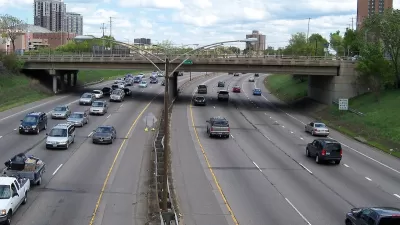The Minneapolis Saint Paul Regional Economic Development Partnership (Greater MSP) will now longer have funding support from the city of Minneapolis.

"Minneapolis pulled most of its next year’s funding for the regional economic development group," reports Adam Belz, "as council members questioned what benefit the city gets and raised concerns that Greater MSP pits local governments against each other in the race to offer incentives to companies."
"Minneapolis has given $800,000 to Greater MSP since 2011, and the mayor’s proposed 2017 budget included $125,000 for the group," according to Belz. Minneapolis Councilmember Lisa Goodman lead the council's charge to end the funding for the organization, citing "reports that Greater MSP orchestrated a bidding war between local governments when it tried to help Prime Therapeutics, an Eagan-based pharmacy benefits manager, scout for a new headquarters location."
Though Greater MSP officials dispute the city's characterization of its accomplishments, the decision is a blow to regionalism in Minnesota. According to Belz, city officials from Chaska, Bloomington, Anoka County, and Woodbury reported still being satisfied with the work of Greater MSP.
FULL STORY: Minneapolis re-evaluates its ties to Greater MSP

Trump Administration Could Effectively End Housing Voucher Program
Federal officials are eyeing major cuts to the Section 8 program that helps millions of low-income households pay rent.

Planetizen Federal Action Tracker
A weekly monitor of how Trump’s orders and actions are impacting planners and planning in America.

Ken Jennings Launches Transit Web Series
The Jeopardy champ wants you to ride public transit.

Rebuilding Smarter: How LA County Is Guiding Fire-Ravaged Communities Toward Resilience
Los Angeles County is leading a coordinated effort to help fire-impacted communities rebuild with resilience by providing recovery resources, promoting fire-wise design, and aligning reconstruction with broader sustainability and climate goals.

When Borders Blur: Regional Collaboration in Action
As regional challenges outgrow city boundaries, “When Borders Blur” explores how cross-jurisdictional collaboration can drive smarter, more resilient urban planning, sharing real-world lessons from thriving partnerships across North America.

Philadelphia Is Expanding its Network of Roundabouts
Roundabouts are widely shown to decrease traffic speed, reduce congestion, and improve efficiency.
Urban Design for Planners 1: Software Tools
This six-course series explores essential urban design concepts using open source software and equips planners with the tools they need to participate fully in the urban design process.
Planning for Universal Design
Learn the tools for implementing Universal Design in planning regulations.
Ada County Highway District
Clanton & Associates, Inc.
Jessamine County Fiscal Court
Institute for Housing and Urban Development Studies (IHS)
City of Grandview
Harvard GSD Executive Education
Toledo-Lucas County Plan Commissions
Salt Lake City
NYU Wagner Graduate School of Public Service





























